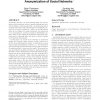Free Online Productivity Tools
i2Speak
i2Symbol
i2OCR
iTex2Img
iWeb2Print
iWeb2Shot
i2Type
iPdf2Split
iPdf2Merge
i2Bopomofo
i2Arabic
i2Style
i2Image
i2PDF
iLatex2Rtf
Sci2ools
130
click to vote
CCS
2009
ACM
2009
ACM
The union-split algorithm and cluster-based anonymization of social networks
Knowledge discovery on social network data can uncover latent social trends and produce valuable findings that benefit the welfare of the general public. A growing amount of research finds that social networks play a surprisingly powerful role in people's behaviors. Before the social network data can be released for research purposes, the data needs to be anonymized to prevent potential re-identification attacks. Most of the existing anonymization approaches were developed for relational data, and cannot be used to handle social network data directly. In this paper, we model social networks as undirected graphs and formally define privacy models, attack models for the anonymization problem, in particular an i-hop degree-based anonymization problem, i.e., the adversary's prior knowledge includes the target's degree and the degrees of neighbors within i hops from the target. We present two new and efficient clustering methods for undirected graphs: bounded t-means cluster...
Related Content
| Added | 23 Nov 2009 |
| Updated | 23 Nov 2009 |
| Type | Conference |
| Year | 2009 |
| Where | CCS |
| Authors | Brian Thompson, Danfeng Yao |
Comments (0)

